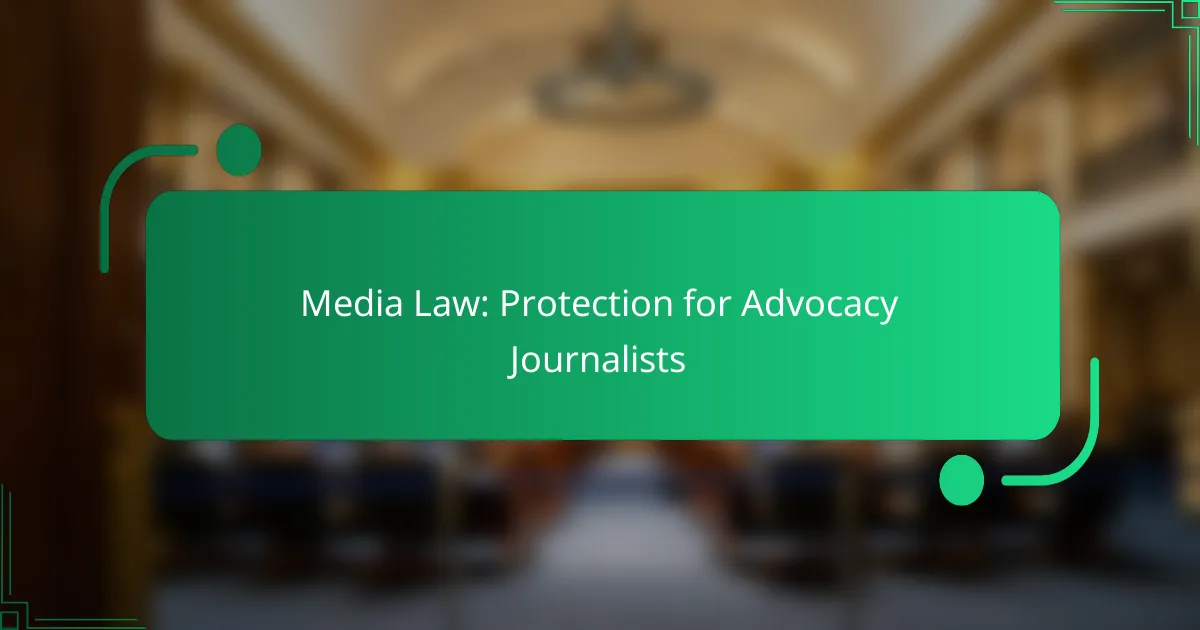Advocacy journalists in the United States are afforded essential legal protections that uphold their freedom of expression and support their critical work. These protections, including First Amendment rights and shield laws, enable journalists to address significant societal issues without the looming threat of censorship or retaliation. Understanding these legal frameworks is vital for advocacy journalists to navigate the challenges they face in their pursuit of truth and justice.
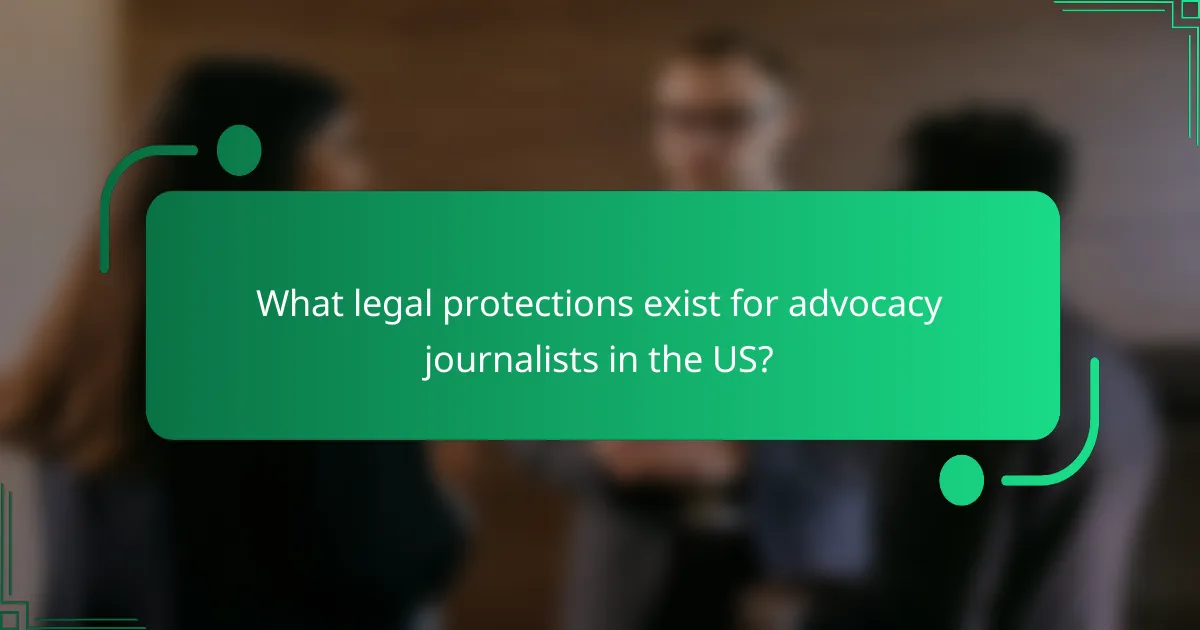
What legal protections exist for advocacy journalists in the US?
Advocacy journalists in the US benefit from several legal protections that help safeguard their work and freedom of expression. These protections include First Amendment rights, shield laws, defamation laws, and press freedom protections, all of which play a crucial role in enabling journalists to report on important issues without fear of retaliation or censorship.
First Amendment rights
The First Amendment of the US Constitution provides strong protections for freedom of speech and the press, allowing advocacy journalists to express their views and report on matters of public interest. This constitutional right protects journalists from government censorship and allows them to investigate and publish information without undue interference.
However, these rights are not absolute. Advocacy journalists must navigate the balance between free expression and other legal considerations, such as privacy rights and national security concerns. Understanding the scope of First Amendment protections is essential for effective advocacy journalism.
Shield laws
Shield laws are designed to protect journalists from being compelled to disclose their sources or unpublished information in legal proceedings. While not all states have comprehensive shield laws, many provide varying degrees of protection, which can be crucial for advocacy journalists who rely on confidential sources to expose wrongdoing.
Journalists should familiarize themselves with the specific shield laws in their state, as the level of protection can differ significantly. In some jurisdictions, a journalist may be required to reveal sources if the information is deemed critical to a case, while others may offer stronger protections against such disclosures.
Defamation laws
Defamation laws protect individuals from false statements that could harm their reputation. Advocacy journalists must be cautious when reporting on individuals or organizations to avoid potential defamation claims. To succeed in a defamation lawsuit, a plaintiff typically must prove that the statement was false, damaging, and made with actual malice if the plaintiff is a public figure.
Understanding the nuances of defamation laws is vital for advocacy journalists. They should strive for accuracy and fairness in their reporting, and consider including disclaimers or context to mitigate the risk of defamation claims.
Press freedom protections
Press freedom protections are essential for advocacy journalists, ensuring they can operate without fear of government retaliation. These protections vary by state and can include laws that limit prior restraint, which is the government’s ability to prevent publication before it occurs.
Advocacy journalists should stay informed about local and federal press freedom initiatives and challenges. Engaging with organizations that advocate for press freedom can provide valuable resources and support in navigating legal issues related to their work.
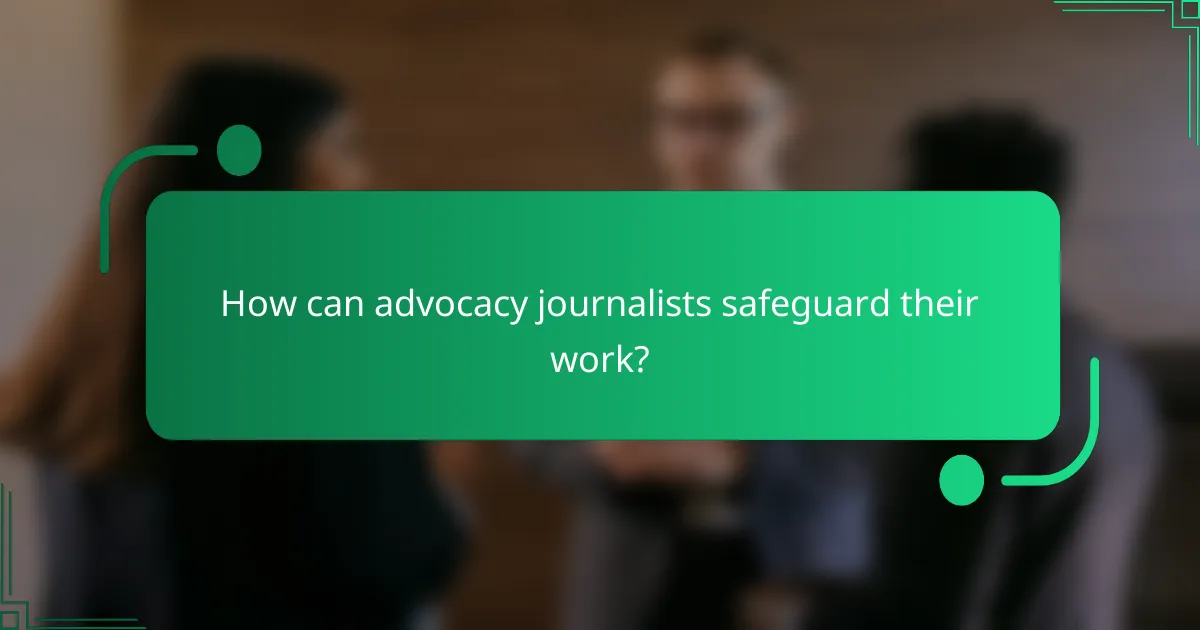
How can advocacy journalists safeguard their work?
Advocacy journalists can safeguard their work by employing various strategies that protect their rights and ensure their safety. Key measures include seeking legal counsel, understanding copyright laws, and using secure communication tools to mitigate risks associated with their reporting.
Utilizing legal counsel
Engaging legal counsel is essential for advocacy journalists to navigate the complexities of media law. A knowledgeable attorney can provide guidance on defamation, privacy rights, and other legal issues that may arise during reporting. This proactive approach helps journalists understand their rights and the potential legal repercussions of their work.
It is advisable to establish a relationship with a lawyer experienced in media law before issues arise. This can facilitate quick access to legal advice when urgent situations occur, such as threats of litigation or harassment.
Understanding copyright laws
Advocacy journalists must be aware of copyright laws to protect their original content and avoid infringing on others’ rights. Familiarity with the principles of fair use can help journalists utilize existing materials legally while still advocating for their causes. This includes knowing how to credit sources properly and understanding the limitations of using copyrighted material.
Journalists should also consider registering their work with copyright offices to establish ownership, which can be beneficial in case of disputes. This step can serve as a deterrent against unauthorized use of their content.
Implementing secure communication tools
Using secure communication tools is crucial for advocacy journalists to protect sensitive information and maintain confidentiality. Tools like encrypted messaging apps and secure email services can help safeguard conversations from unauthorized access. Journalists should regularly update their software to ensure they are using the latest security features.
Additionally, employing virtual private networks (VPNs) can enhance online privacy, especially when accessing information in restrictive environments. Journalists should be trained on how to use these tools effectively to minimize the risk of surveillance or data breaches.
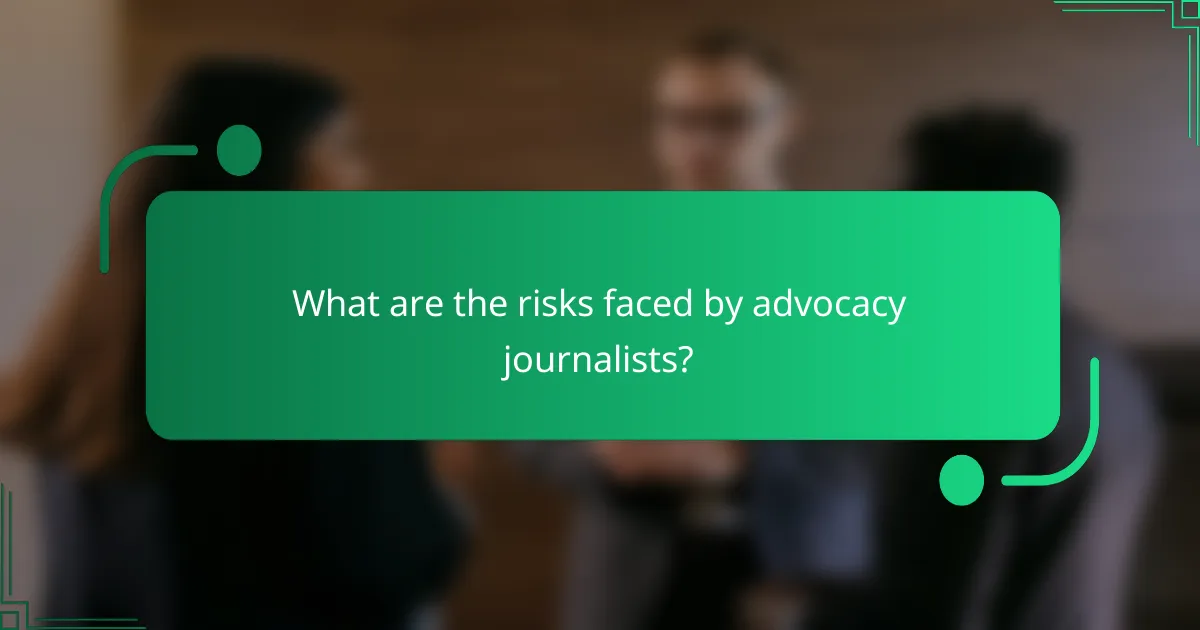
What are the risks faced by advocacy journalists?
Advocacy journalists encounter various risks that can jeopardize their safety and freedom. These risks include legal repercussions, physical threats, and online harassment, all of which can significantly impact their ability to report effectively.
Legal repercussions
Advocacy journalists often face legal challenges, including lawsuits and criminal charges, particularly when reporting on sensitive topics. In some countries, laws may restrict freedom of speech, leading to potential fines or imprisonment for journalists who challenge the status quo.
For instance, defamation laws can be misused to silence journalists, especially when they report on powerful individuals or organizations. It is crucial for journalists to understand the legal landscape in their country and seek legal counsel when necessary to navigate these risks.
Physical threats
Physical threats against advocacy journalists can range from intimidation to violence. Journalists covering protests, corruption, or human rights abuses are particularly vulnerable, as their work may provoke backlash from those in power or opposing groups.
In regions with high levels of political unrest, journalists may face direct threats to their safety, including kidnapping or assault. Implementing safety protocols, such as traveling in groups and using secure communication methods, can help mitigate these risks.
Online harassment
Online harassment is a pervasive issue for advocacy journalists, often manifesting as threats, doxxing, or cyberbullying. Social media platforms can amplify these attacks, making it challenging for journalists to maintain their mental well-being and professional integrity.
To combat online harassment, journalists should consider using privacy settings, reporting abusive behavior, and engaging with support networks. Establishing a strong online presence while protecting personal information is essential for navigating this digital landscape safely.

What role do organizations play in supporting advocacy journalists?
Organizations play a crucial role in supporting advocacy journalists by providing resources, legal protection, and training. These entities help ensure that journalists can operate safely and effectively while promoting social justice and accountability.
Press freedom organizations
Press freedom organizations advocate for the rights of journalists and work to protect them from censorship and violence. They often monitor threats to press freedom and provide reports that highlight issues affecting advocacy journalism globally.
Examples of such organizations include the Committee to Protect Journalists (CPJ) and Reporters Without Borders. These groups engage in lobbying efforts to influence policy changes that enhance protections for journalists.
Legal aid resources
Legal aid resources offer essential support to advocacy journalists facing legal challenges. These resources may include pro bono legal services, access to legal advice, and representation in court for cases involving defamation, harassment, or other threats to journalistic integrity.
Organizations like the Media Legal Defence Initiative provide legal assistance specifically tailored to journalists. They help navigate complex legal frameworks and ensure that journalists understand their rights under local laws.
Training programs
Training programs equip advocacy journalists with the skills necessary to navigate the challenges they face in their work. These programs often cover topics such as digital security, ethical reporting, and legal rights, helping journalists to protect themselves and their sources.
For instance, the International Center for Journalists offers workshops and online courses that focus on best practices in advocacy journalism. Such training can significantly enhance a journalist’s ability to report safely and effectively in high-risk environments.
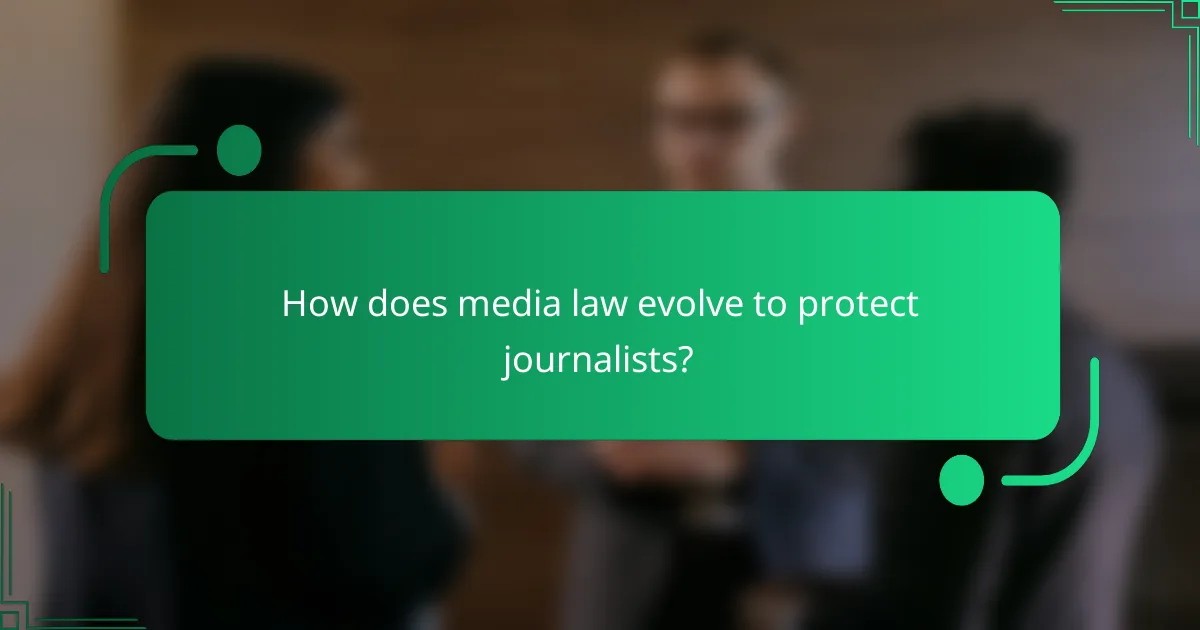
How does media law evolve to protect journalists?
Media law continuously adapts to safeguard journalists, particularly those engaged in advocacy. This evolution is driven by the need to address emerging challenges, such as digital threats and the increasing risks faced by reporters in various environments.
Recent legislative changes
Recent legislative changes have focused on enhancing protections for journalists, especially in the context of digital media. For instance, some countries have introduced laws that specifically criminalize the harassment of journalists and provide penalties for those who obstruct their work.
Additionally, several jurisdictions have enacted shield laws that protect journalists from being compelled to reveal their sources, which is crucial for maintaining the confidentiality necessary for investigative reporting.
Case law developments
Case law developments have played a significant role in shaping the legal landscape for journalists. Courts have increasingly recognized the importance of press freedom, leading to rulings that favor journalists in cases involving defamation and access to public records.
Notable cases have set precedents that reinforce the rights of journalists to operate without undue interference, thereby strengthening their ability to report on issues of public interest.
International standards
International standards for media protection emphasize the necessity of safeguarding journalists’ rights globally. Organizations such as the United Nations and the European Union advocate for laws that protect journalists from violence and intimidation.
These standards encourage member states to adopt measures that align with best practices in media freedom, ensuring that journalists can perform their duties without fear of retribution.
